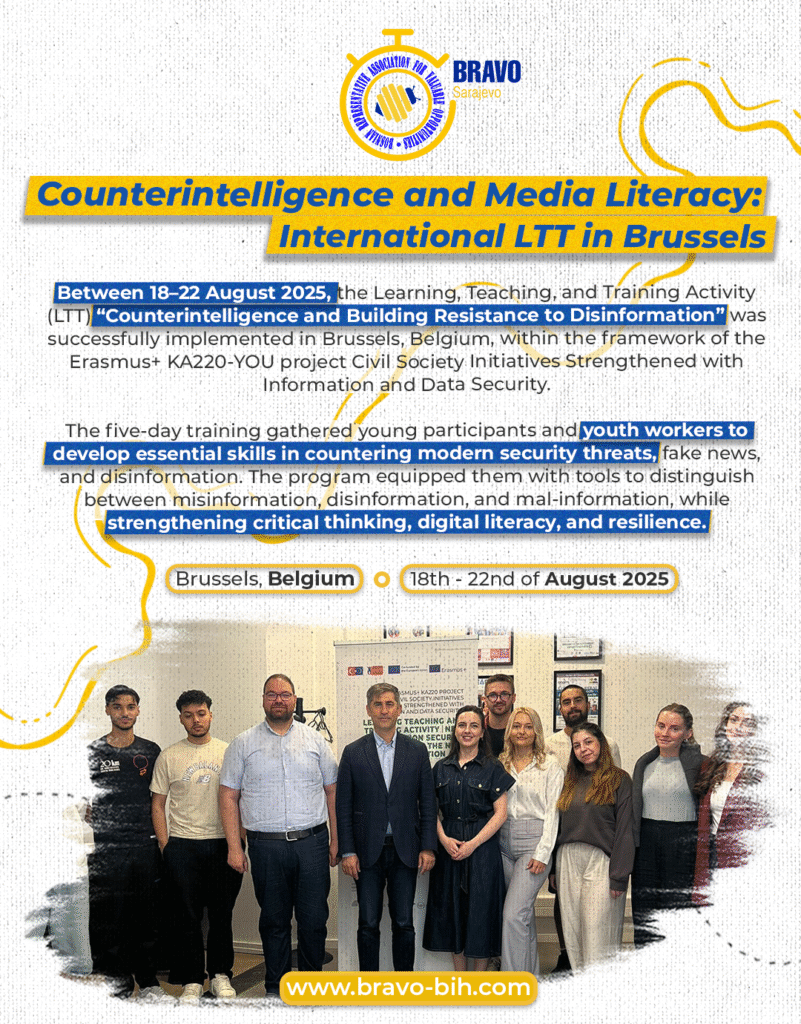
Between 18–22 August 2025, the Learning, Teaching, and Training Activity (LTT) “Counterintelligence and Building Resistance to Disinformation” was successfully implemented in Brussels, Belgium, within the framework of the Erasmus+ KA220-YOU project Civil Society Initiatives Strengthened with Information and Data Security. The activity was coordinated by SETA with the support of partner organizations ANKA, BRAVO, TTB, MHRA, TÜGVA, and SETA Brussels.
Purpose and Objectives
The five-day training gathered young participants and youth workers to develop essential skills in countering modern security threats, fake news, and disinformation. The program equipped them with tools to distinguish between misinformation, disinformation, and mal-information, while strengthening critical thinking, digital literacy, and resilience. By fostering an international exchange of knowledge, the LTT contributed directly to the project’s long-term goal of empowering civil society organizations with stronger information and data security capacities.
Activity Overview
The LTT followed an intensive agenda that combined lectures, workshops, simulations, and group work.
The training began with a strong foundation in intelligence theory, the intelligence cycle, and the basics of OSINT (Open Source Intelligence), before moving into an exploration of disinformation concepts and counter-strategies. Building on this, participants examined counterintelligence practices, the psychological impact of propaganda, and the growing challenges of cyber threats.
As the program progressed, they analyzed real national and international disinformation cases, practiced fact-checking and verification methods, and developed group strategies for tackling manipulation. Later sessions introduced advanced OSINT tools, highlighted the differences between misinformation, disinformation, and mal-information, and engaged participants in scenario-based wargaming simulations.
The activity concluded with a full day dedicated to team-based crisis simulations, where participants applied their learning in real-time, coordinated strategic responses, and presented their outcomes. This structure ensured that participants not only absorbed theoretical knowledge but also gained practical, hands-on experience through highly interactive exercises and realistic simulations.
Participants and Learning Outcomes
The activity welcomed motivated young leaders, including Emelin Hasanspahić and Delila Vatreš who represented Bosnia and Herzegovina and BRAVO.
By the end of the training, participants were able to:
- Define and analyze different forms of information manipulation.
- Apply fact-checking and verification methods in real-life scenarios.
- Understand the psychological and social impact of disinformation.
- Strengthen teamwork, communication, and problem-solving through collaborative exercises.
Trainers highlighted the high engagement levels of participants, noting their ability to apply newly acquired methods in practical exercises.
Participant Impressions
Participant feedback confirmed the positive impact of the training:
- “Throughout the project, I was surrounded by an amazing team full of knowledge and wisdom. I am grateful for the chance to learn from older and more experienced people, and to explore the vibrant city of Brussels at the same time.” – Emelin Hasanspahić
- “The sessions were informative yet interactive, with plenty of space to share and reflect. What truly made the experience unforgettable were the people, the exchange of ideas, and the supportive atmosphere. I came back home with new skills, motivation, and friendships.” – Delila Vatreš
The LTT in Brussels demonstrated how international cooperation, youth engagement, and innovative training methodologies can significantly contribute to strengthening civil society resilience against disinformation. With motivated participants, skilled trainers, and a well-structured agenda, the activity succeeded in creating both immediate learning outcomes and long-term impact for the project’s objectives.
